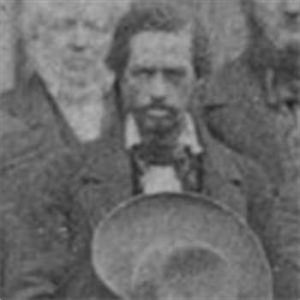
Charles H. Langston
*The birth of Charles Langston in 1817 is celebrated on this date. He was a Black slave, editor, abolitionist, and teacher.
From Louisa County, Virginia, Charles Henry Langston was the second of three sons and a daughter born to Lucy Jane Langston, a freedwoman of African and Native American descent, and Ralph Quarles, a wealthy white plantation owner of English descent. Quarles freed Lucy and their daughter Maria in 1806 after a relationship of more than 25 years. Quarles also made provisions for his "natural" (illegitimate) children to inherit his substantial fortune after his death.
Langston gained his freedom in 1834, and in 1835, he and his brother, Gideon, were the first African Americans to attend Oberlin College in Ohio. Two years later, he established a school for Black children in Chillicothe, Ohio. Langston was a member of the Liberty Party and the Ohio Anti-Slavery Society and edited the abolitionist journal Palladium of Liberty (1842-43). He was also a leader of the National Organization of the Sons of Temperance. Appointed principal of the Columbus Colored School in 1856, Langston remained active in the anti-slavery movement. He was also a conductor on the Underground Railroad and, in 1858, was convicted for breaking the Fugitive Slave Act.
Early in the American Civil War in 1862, Langston moved to Leavenworth, Kansas, where he organized a school for contrabands, escaped slaves who had fled to Union lines from Missouri. He taught the children for about three years. In 1863, Langston returned to Ohio and, like his brother John Mercer, helped recruit Blacks for the United States Colored Troops when Ohio raised its first regiment. By 1865, approximately 2,455 Black people, nearly one-fifth of those in Kansas, lived in Leavenworth, near the Missouri border. In 1865, Langston was appointed general superintendent for Refugees and Freedmen for the Freedmen's Bureau in Kansas. There were more than 12,000 Blacks in Kansas by then.
In 1868, Langston moved near Lawrence, Kansas, where he purchased a farm. In 1872, he was appointed president of Quindaro Freedman's School (later Western University) near Kansas City. Today, the historic Quindaro Townsite is part of present-day Kansas City. In 1880, Langston was president of a statewide Convention of Colored Men that called on the Refugee Relief Board to utilize the monies and goods donated to the new migrants and settle them on school properties to help them establish themselves. Also in Lawrence, Langston served as associate editor of the Historical Times, a local paper that promoted the cause of equal rights and justice for Blacks. Charles Langston, the grandfather of author Langston Hughes, died in Lawrence, Kansas, in 1892.